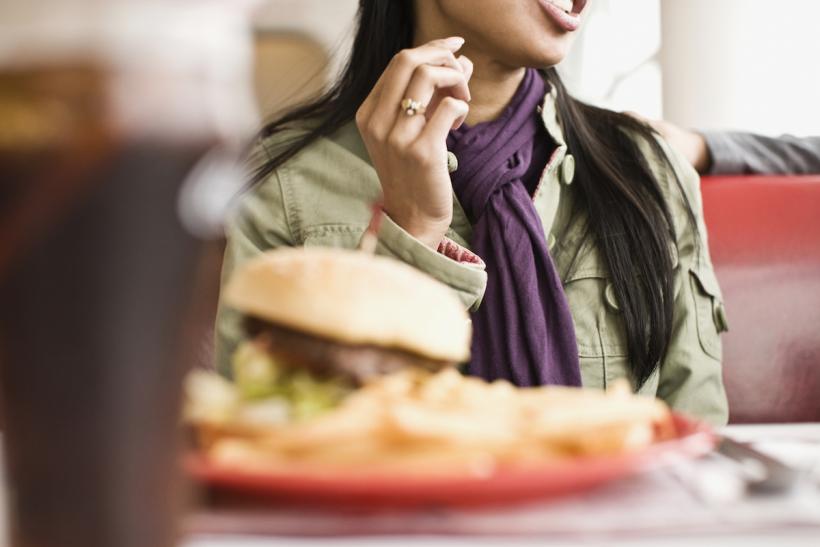
The reality is that I did not become poor because I ate a meal in a restaurant one too many times.
The details change, but it’s the same message every time.
“If you just stopped eating out, you’d be able to afford to do X, Y, and Z!”
The “you” that these messages are directed towards tends to be anyone on a budget, but low income people and people living in poverty especially. And, to be perfectly honest, the idea seems sound enough, if you just look at it on the surface. Poor people often struggle to afford basic necessities, and often don’t have money to do things that they want to do. And buying prepared foods, at a restaurant, cafe, or even a convenience store, tends to cost more than cooking food at home, because you are also paying for the labor necessary for preparation.
So, if you weren’t thinking about it too carefully, you might think, hey, here is a population that is constantly strapped for cash, and here is a simple and easy way for them to save money! And then you might suggest that poor folk, people like me, should just simply stop dining out, or buying coffee to go, or grabbing breakfast on their way into work. It might seem annoying to you that folks who don’t have a lot of money seem to be wasting what little they do have on such unnecessary items. Don’t they know that they could make dinner at home for half that much? It’s their own fault they struggle to pay their bills if they’re going to keep living like that!
Stop right there.
You do not get to decide how anyone else spends their money.
And the details surrounding class, classism, and food, are so complex as to deserve a closer look. There are many reasons that low income people may choose to occasionally dine out, and in many cases those reasons are so powerful as to make grabbing dinner the best possible option. But guess what? It’s not your job to assess whether or not it’s the best possible option, because you do not get to decide how anyone else spends their money!
In fact, us poor people, just like everyone else, make our food purchasing decisions based on a wide variety of factors. We’re often weighing a complicated mental equation of pros and cons, and sometimes it turns out that having lunch out, or ordering a pizza, or whatever, really is the best possible decision for us on that given day. A few of the reasons a low-income person might choose to dine out or order in include:
1. Time is money.
Many of us are struggling to work enough in a given week to pay our bills. Cooking food takes time, even simple stuff. If paying for dinner for my family means I’ll make more money in the long run (and especially if I’ll make considerably more than the price of dinner, which is actually sometimes the case!) then yeah, you bet I’m going to buy dinner rather than dragging myself away from work and into the kitchen.
2. Planning doesn’t always work.
Look, you try to plan ahead, but sometimes it fails. Sometimes you mess up your grocery shopping schedule by accident, or sometimes you don’t have a choice because you got too sick. And now it’s Thursday night, your child is hungry, and you don’t have a car because you’re poor, and all you have in the house are dry beans that take a zillion years to cook and a can of mandarin oranges. You could walk to the store with a crying child, buy groceries, walk home, and have dinner on the table an hour after the kid should be in bed. Or hey, you could order a damn pizza right now!
3. The stress factor.
You know how, when you’ve had a really horrible stressful day you are more likely to do the easy thing than the best possible thing? Well, shockingly, poor people, being people, often have the same experience!
4. Sometimes we want something special.
Look, poor people may be broke, but we’re not dead. We have cravings and wants just like everyone else in the universe, and while we often can’t act on them, sometimes we can and do! Maybe every once in awhile you want to eat something that you don’t know how — or don’t have and can’t afford the equipment — to make!
Maybe you really need a night off from doing the dishes. Maybe you’re like me and you work from home (in part because you can’t afford childcare and it allows you to make your own schedule) and you haven’t left the house in days and days and this is the only way you are going to get out. Sometimes you just have to do it, and when we are talking about anyone other than poor people, it seems like folks get that, at least to some degree.
But that brings me to my real point here. Because when we tell poor people what they should (yes healthy produce) and shouldn’t (no pumpkin spice latte!) spend their own money on, it might seem like trying to help, but it’s rooted deeply in classism. It’s telling poor people that they wouldn’t be as poor if they just lived exactly the way we think they should. It’s telling them that being poor is their own fault. It’s telling them that we know how to live their lives better than they do. And most of all, and this is the most insulting thing of all, it’s telling them that because they are poor, they don’t deserve to make their own financial decisions.
I’m a poor person. I live below the U.S. poverty line. And yeah, I deserve to make my own financial decisions.
The reality is that I did not become poor because I ate a meal in a restaurant one too many times, and while it’s true that eating out less can affect one’s budget, refusing to ever eat out again won’t make me not poor. Even if it did seemingly make me as financially capable as a middle class person (and it wouldn’t, I’m not actually spending enough money dining out for all that), it would be a rouse. Because guess what? Middle class people can afford to go out for dinner once in awhile.
So, join me. Let’s all stop judging poor and low income folk for what might look like splurges to us, let’s stop assuming we know better than they do how to handle their own finances and feed themselves. Let’s stop talking down to poor people like we assume they don’t know what stuff costs. And please, let’s all just mind our own damn business.








